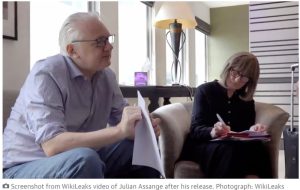referendum, the Irish Daily Mail can today reveal.
the Lisbon Treaty vote is passed when it is put to the
Foreign Affairs Minister Dermot Ahern has even been
October referendum, which would have been better
rehashed version of the failed EU constitution.
The memo was sent to the British government by
Elizabeth Green, a senior UK diplomat in Dublin,
following a briefing from Dan Mulhall, a top official
in the Department of Foreign Affairs.
Its aim was to relay to her political masters in
London the lengths to which the Government here was
Ireland is the only EU state which is allowing voters
a say on the treaty, and European heads of state are
terrified that they will reject it.
Campaigners have warned that the new treaty could
However, the most controversial aspect is the
a foundation-stone of the State.
France is particularly keen to advance the notion of
an EU force, which critics fear could be ordered into
action over Irish objections by a majority vote of EU
heads of state.
Already concerns have been raised that soldiers who
are part of the Irish peacekeeping force being sent to
Chad could be compromised by French political and
military objectives in the area.
The leaked email admits that this is one of the issues
which needs to be kept from voters, saying that the
possibility of the French speaking out on this issue
meant that the referendum could not be delayed until
World Trade Organisation talks, which have already
aroused the fury of farmers, could turn the voters
against the new treaty. Farmers and suppliers are
planning a one-day shut down this week to protest at
the tack being taken by EU trade commissioner Peter
Mandelson.
the powerful farming association to withdraw its
be read or understood by most voters – and that
launching a quick referendum would stop them from
held on June 12 – although it is not clear from the
email whether this is the correct date or whether the
had maintained that other partners – including the
commission – were playing a helpful low-profile role.
It added that during a trip to Dublin, Vice-President
the ratification process so far. We would need to
Whether the Lisbon Treaty is accepted by the Irish
public or not, one thing is clear – the Government
campaign in its favour is already one of the most
deeply dishonest in Irish history.
foreign politicians to deceive its own electorate
speaks of profound betrayal. For months, ministers
have been calling for a fair campaign based on the
facts of the treaty itself.
Now we know that all the while the very same ministers
have been collluding in a campaign of deliberate
misinformation. That the Irish people should be the
victims of a dishonest alliance between their own
govenrment and outside powers is something many will
find very hard to forgive quickly.
As for the Lisbon Treaty itself, voters will now find
it very difficult to trust a single word the
Govenrment says in its defence. At each stage, the
aim has not been to inform the electorate but to
deceive it.
Instead of scheduling polling day for October,which
would allow the country to come to grips with the
treaty s byzantine complexity, the Government has
specifically chosen a date to capitalise on the
artificial uncertainty this premature vote creates.
Even the precise timing has been cynically manipulated
to catch the other side off-guard. This is not just
poor form; it is a thoroughly undemocratic way to
conduct what is supposed to be a free and fair vote.
These low tricks are not just a case of using dark
arts for narrow tactical advantage, they are
deliberate lies about crucial matters of the Irish
mean we lose control over our military commitments and
that our low corporate tax rate might be abolished by
Brussels. Now we know that on both counts the
We are voting earlier than would ordinarily be
expected so that voters will not have a chance to see
new defence developments in the EU that officials
expect from the French EU presidency later this year.
Opinion divides on the merits and demerits of Irish
neutrality, but that question should be decided by
Irish voters, not slipped through on false premises.
harmonisation have been sidelined.
This all amounts to a shocking culture of lying in the
highest echelons of Irish politics. Deliberate lying
about vital matters of Irish national interest should
be unreservedly condemned by those in favour of Lisbon
as much as by those against. The political culture in
which this is possible is the proof, also, of just how
Many people have not yet reached an opinion about the
Lisbon Treaty. That decision must be taken on the
full facts and not on a shimmering mirage of
dishonesty.
Nor should we be afraid to consider our relationship
with the EU anew. We have been well served by EU
membership in the past. We are under no obligation,
simply for that reason.
If there is a case for the Lisbon Treaty on the merits
of the actual document, the Government should make it
– and should be able to make it easily and
wonder why a campaign based on proven dishonesty
should be given the benefit of the doubt when such
crucial issues are at stake.






